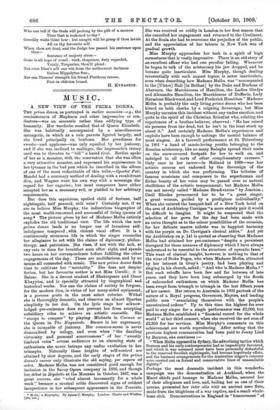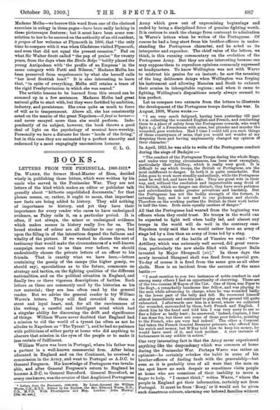MUSIC.
A NEW VIEW OF THE PRIMA DONNA. THE prima donna, as portrayed in earlier memoirs—e.g., the reminiscences of 3Iapleson and other impresarios or con- duotors—was an eccentric rather than edifying type of humanity. Her wardrobe recalled that of Queen Elizabeth. She was habitually accompanied by a miscellaneous menagerie, in which as a rule parrots figured largely, and she lived principally on bonbons. Her greediness for sweets—and applause—was only equalled by her jealousy, and if she was inclined to malinger, the impresario's trump card was to threaten to " bill " a hated rival. Berlioz spoke of her as a monster, with the reservation that she was often a very attractive monster, and expressed his acquiescence in her tyranny in the bad pun which he inscribed in the album of one of the most redoubtable of this tribe,—Oportet Pati. Handel had a summary method of dealing with a recalcitrant diva, and Wagner went his own way with .a sovereign dis- regard for her vagaries ; but most composers have either accepted her as a necessary evil, or yielded to her arbitrary requirements.
But does this capricious, spoiled child of fortune, half nightingale, half peacock, still exist ? Certainly not, if we are to believe Miss Murphy, the industrious biographer of the most world-renowned and successful of living queens of song.* The picture given by her of Madame Melba entirely explodes the old traditional view. The life which the new prima donna leads is no longer one of luxurious self- indulgence tempered with violent vocal effort. It is a continuously strenuous life in which the singer reconciles her allegiance to art with the claims of diplomacy, philan- thropy, and patriotism, She rises, if not with the lark, at any rate in time for breakfast soon after eight, and spends two hours on her correspondence before fulfilling the other engagements of the day. These are multifarious, and by no means all connected with music. The new prima donna finds time to cultivate her "mentality." She does not despise fiction, but her favourite author is not Miss Corelli ; it is Balzac. She is a devout student of Shakespeare and Omar Khayytim, and is specially attracted by biographical and historical works. Nor can the claims of society be forgone, for the modern diva, in virtue of her many-sided equipment, is a persona grata in the most select coteries. Withal she is thoroughly domestic, and observes an almost Spartan simplicity in her diet. On the lyric stage her acknow- ledged pre-eminence does not prevent her from accepting subsidiary roles to achieve an artistic ensemble. She "stoops to conquer" by playing Michaels in Carmen or the Queen in The Huguenots. Secure in her supremacy, she is incapable of jealousy. Her common-sense is never demoralised by enlogy, and even when "the dazzling virtuosity and personal sonorousness" of her "sweetly timbred voice" arouse audiences to an alarming state of enthusiasm she never betrays any undue exultation • in her triumphs. Naturally these heights of self-control are attained by slow degrees, and the early stages of the prima donna's career only illustrate the old saying, per aspera ad astra. Madame Melba was not considered good enough for inclusion in the Savoy Opera company in 1886, and though her debut in Bigoletto at the Monnaie in October, 1887, was a great success, she "cried almost incessantly for a whole week because a musical critic discovered signs of evident inexperience in her subsequent appearance in the Traviata.
• Melba : a Biography. By Agnes C. Murphy. London: Chatto and Winans. [16s. net.]
She was received so coldly in London in her first season that she cancelled her engagement and returned to the Continent. At the Scala she had to overcome the prejudice of the public, and the appreciation of her talents in New York was of gradual growth.
Miss Murphy approaches her task in a spirit of high earnestness that is vastly impressive. There is an old story of an excellent officer who had one peculiar failing. Whenever he began to talk of the aristocracy his jaw dropped, and he became quite inarticulate. Miss Murphy, though dealing reverentially with such august topics, is never inarticulate, even when describing how Madame Melba was "accompanied to the [Ulster] Hall [in Belfast] by the Duke and Duchess of Abercorn, the Marchioness of Hamilton, the Ladies Gladys
and Alexandra Hamilton, the Marchioness of Dufferin, Lady Hermione Blackwood, and Lord Frederick Hamilton." Madame Melba is probably the only living prima donna who has been
kissed on both cheeks by a reigning Sovereign; but Miss Murphy narrates this incident without any undue emotion, and quite in the spirit of the Christian Scientist who, relating the experiences of a brother-believer, observed: "He has raised six persons from the dead, but he isn't in the least stuck up about it." And certainly Madame Melba's experiences and exploits have been enough to unhinge the mental balance of most singers. At a farewell performance at St. Petersburg in 1891 "a band of music-loving youths belonging to the Russian aristocracy, like so many Raleghs spread their coats on the snow-covered footpath for her to walk on, and indulged in all sorts of other complimentary excesses." Only once in her career—in Holland in 1899—was her artistic success not endorsed by the Sovereign of the country in Which she was performing. The tributes of famous musicians and composers to the superhuman and divine beauty of her voice may be passed over as natural ebullitions of the artistic temperament; but Madame Melba.
was not merely called "Madame Stradivarius" by Joachim ; Cecil Rhodes pronounced her to be "a great singer, a great woman, guided by a prodigious individuality!'
When she entered the banquet-hall of a New York hotel on the arm of Archbishop Corrigan "a more stately pair it would be difficult to 'imagine. It might be suspected that the selection of her gown for the day had been made with an extra thought as to the colour possibilitieti of the occasion, for her delicate mauve toilette was in happiest harmony
with the purple on Dr. Corrigan's clerical attire." And yet the Archbishop on p. 141 is quoted as observing that Madame Melba had attained her pre-eminence "despite a persistent disregard for those nuances of diplomacy which I have always understood to be essential to the structure of operatic fame." This want of clerical insight, however, is nothing to that of the vicar of Stoke Poges, who when Madame Melba, attracted by her interest in Gray's poetry, had been playing and singing in his church, asked : "And who is Madame Melba ? "
But such rebuffs have been few and far between of late years, and they have been long submerged by the floods of unbounded enthusiasm on which Madame Melba has been swept from triumph to triumph in the last fifteen years of her career. Her return to Australia in 1902 partook of the nature of a Royal progress, Governors, Mayors, and leading public men "associating themselves with the people's unrestrained ardour." Up to this time the highest fee ever paid to any singer for a single performance was £2,000, but, Madame Melba established a "financial record for the whole world" at her third concert, when she received the net sum of 22,350 for her services. Miss Murphy's comments on this achievement are worth reproducing. After noting that the previous highest remuneration had been paid to fenny Lind by Barnum, she continues :—
"When Melba appeared in Sydney, the advertising tactics which Barnum and his early contemporaries had so impudently favoured, and which it was assumed must have been personally distasteful to the reserved Swedish nightingale, had become hopelessly effete, and the business arrangements for the Australian singer's concerts were carried out on formal and conservative lines of unassailable dignity."
Perhaps the most dramatic incident in this wonderful campaign was the demonstration at Auckland, when the
Maori chiefs paid homage to Madame Melba, assured her of their allegiance and love, and, hailing her as one of their
queens, presented her inter alia with an ancient nose flute, made from the thighbone of a war captive, and a small whale-
bone club. Demonstrations in England in " honourment " of
Madame Melba—we borrow this word from one of the choicest exercises in eulogy in these pages—have been sadly lacking in these picturesque features ; but it must have been some con- solation to her to be assured on the authority of an old resident, a propos of her welcome at Plymouth in 1906, that "the only time to compare with it was when Gladstone visited Plymouth, and even that did not equal the present occasion." Fed on what Sir Walter Scott called "the pap of praise" for twenty years, from the days when the Btoile Beige "boldly placed the young Antipodean with 'the profile of an Empress' in the same category with Patti and Nilsson," Madame Melba has been preserved from megalomania by what she herself calls "her level Scottish head." It is also interesting to learn that, "in spite of everything, Melba still retains a trace of the rigid Presbyterianism in which she was reared."
The artistic lessons to be learned from this record can be summed up in a few sentences. Madame Melba had great natural gifts to start with, but they were fortified by ambition, industry, and persistence. She owes quite as much to force of will as to temperament. Above all, she has consistently acted on the maxim of the great Napoleon—ii font se borner- and never essayed more than she could perform. Inde- pendently of its subject, however, the book throws a good deal of light on the psychology of musical hero-worship. Personally we have a. distaste for these "lauds of the living," but in this case they are animated by a perfect sincerity and redeemed by a most engagingly unconscious humour.
C. L. G.











































 Previous page
Previous page